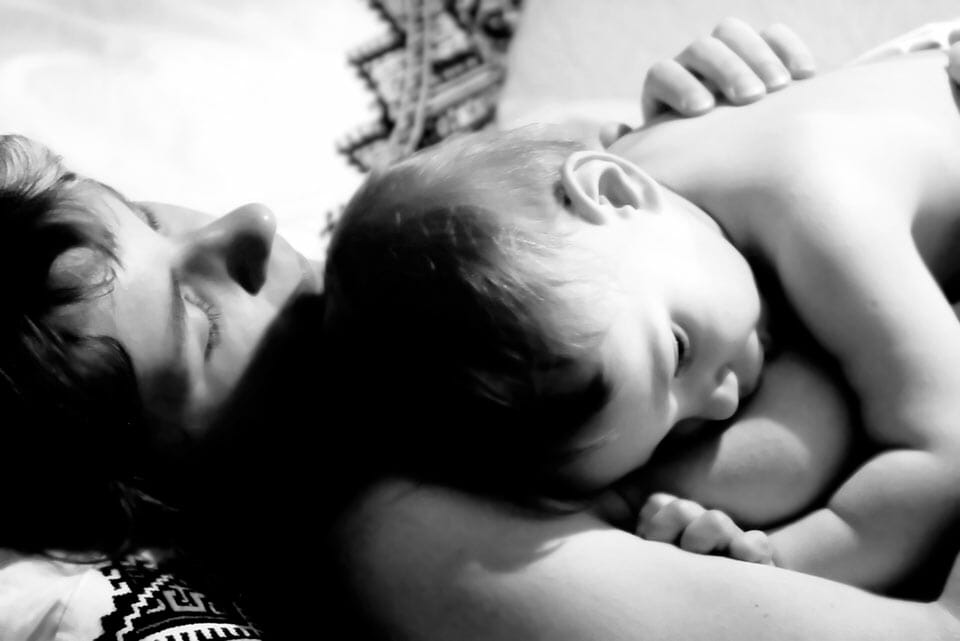Like an iceberg, what drives overeating lies underneath the surface

Iceberg solitary in the sea. Outside and under water sides shown. Soft cloudy sky in the background.
Overeating is usually viewed as a dysfunctional behavior: something to fix, heal or overcome. Or it’s seen as a “moral failure,” something bad to be controlled. These mechanistic approaches are soul killling, hinder healing, and ignore a crucial point: what’s driving the overeating in the first place?
What if the drive to overeat had intelligence and wisdom in it – was something to be respected and listened to, rather than cut out or overcome?
And what if it serves a purpose?
I often tell people: if you’re overeating, it’s for a good reason. The impulse to binge or overeat does not arise in a vacuum. There is much going on underneath the surface that feeds the desire to binge or overeat.
Binges and overeating are a response to overwhelm

Overeating (and binge eating) are both energy releasing behaviors. They are driven by emotion, and are a coping strategy in the face of overwhelming emotions, experiences, triggers, panic, and fear. When you overeat, you bring yourself ease, temporarily moving and softening the build up of tension from this emotional pain.
Binges can happen so quickly and intensely, full of driving energy, that it may be difficult to slow down and see what’s going on. It’s helpful to think of binges as akin to a panic attack: a sudden, intense response to being triggered by something that feels too much to bear. Far from being a “poor choice” or a mistake, a binge makes perfect sense: it’s simply how your nervous system is trying to feel safe, soothed, and “held.”
A binge can feel temporarily soothing, relaxing, and calming, for it creates an outlet for the pent up energy to move. This is true even while a binge brings up feelings of disgust, fear, anger, shame, and frustration – all the self recrimination that arises afterwards. Sometimes, the fear and anger about the binge creates enough tension and overarousal to lead to another binge, and the cycle continues.
Look through the eyes of the heart

Overeating is a powerful opportunity for healing and connection.
When you feel the urge to binge or overeat, you may close down. You may grasp after control strategies – things like dieting, trying to eat a perfect diet, finding the best diet, trying to control cravings, trying to control your emotions and more – to try to control the urge to binge. Or you may try and “make up for the overeating” with fasting, purging, “perfect clean eating,” and overexercising.
Both are driven by our collective fear of binges, as well as the shame that they arise at all.
Try on this perspective instead: what if you viewed binges through the eyes of mercy? Overeating is not something to control, but something to open to. For binges are prime opportunities for connection, nourishment and healing.
Pairing this perspective with support when the urge to binge arises is a powerful combination – it can shift both how you see and how you respond to the impulse to binge or overeat. Overeating transforms from a scary, feared, avoided thing into an opportunity for growth and healing – both in your relationship with food, and in your relationship with yourself.
The healing process is a feeling process

Like weather, all emotions need to be felt.
Understanding the emotional role that food serves in your life can bring both relief (healing the shame or guilt you feel about not being able to “control” the overeating), understanding and empowerment.
It sounds like a paradox, but overeating is an intelligent response, a way to feel in control and to have power in the face of what feels so out of control, and in the face of intense feelings of powerlessness. It’s a cry from our human vulnerability, and one that asks for deep respect and listening.
The key to healing is opening up to this vulnerability: embracing, feeling, and opening to the needs, longings, and cries that lie underneath the desire to binge or overeat. It’s an emotional practice.
“I’m scared”
If binges had a voice, they’d say, “I’m scared.” A binge is an attachment cry, a sign that you feel unsafe. Often what precedes a binge are feelings of helplessness, overwhelm, and powerlessness. Sometimes this includes intense feelings – terror, panic, and fear. A binge can be a way to feel safe – to feel empowered, secure, held, less overwhelmed, and helped – in the face of these overwhelming experiences.
What lies underneath a binge
Underneath the pull to binge you’ll uncover very tender emotions, and undigested, unprocessed, unacknowledged grief. There is often emotional loss, wounds, emotional pain, or trauma. It’s this grief – and the emotions that the grief carries, things like anger, sorrow, anxiety, and more – that drives the energy of the binge forward.
The healing process
To heal binge eating you face and feel the grief and losses that lie underneath. When the pain of emotional loss is felt, honored, grieved, and seen, new life can emerge. In many ways, the healing process is the grieving process – feeling, honoring, and integrating these emotional losses. Healing softens the nervous system and drains the overarousal, bringing the nervous system to rest. With this rest, the urge to binge softens.
Feel the emotions underneath
Binges aren’t proof that you’re doing anything wrong. They’re vehicles for emotional healing – the carriers of uncomfortable emotions like grief, anger, frustration, sadness, and more. They bring these needs and emotions up to the surface where they cry out for our connection, holding, attunement and care. The key is not to judge the emotions and feelings that arise, but to give them room to exist.
The safety that fosters healing
Because these deep emotions are vulnerable and touch our defenses, we need the safety of connection – emotional connection, connection with others, spiritual connection, and connection with ourselves – in order to feel those tender emotions. This is why loving relationship is the womb of growth.
What to do when the impulse to binge or overeat strikes
Pair loving relationship with loving structures. Plan for binges and overeating. They will happen. Rather than trying to manage those moments by will power or self control, or shaming yourself for being imperfect, step in with loving support. In the same way that you plan for days of rain (and bring an umbrella), plan on times when you’ll get stuck, overwhelmed, reactive, or afraid. Give yourself an “umbrella” – the support and self care that enables you to move through the “rainy day.” This is an act of kindness and strength – for it takes honesty and humility to admit when we need help.
Food is an emotional bond

Our deepest relationships – like the relationship between a mother and child – are emotional bonds. Our relationship with food can be an emotional bond, too.
Frequently Asked Questions
If alarm, fear, or panic is often what drives a binge, what drives overeating?
Overeating is an attempt to feel safe in the presence of discomfort, overwhelming emotion or pain. In this case, the safety is found in the food itself – the chocolate, brownies, ice cream, pizza or pasta. Overeating temporarily keeps these overwhelming feelings at bay. The food is a home, a “mother,” something you can return to in order to feel safe, secure, and relaxed. Eating the food brings relief from pain and arouses feelings of warmth and connection, which is why you return to the food again and again.
How does overeating become a sticky habit?
Over time, you may feel bonded to the specific food that is your home base, that you turn to (like chocolate or a beloved candy bar) repeatedly in order to feel safe, soothed, and secure. In psychological terms, the food is a secure attachment – an emotional bond. This relationship can deepen, becoming an addiction or obsession. The addiction is something above and beyond a physiological reaction (for example, how the food impacts your brain or body): an emotional dependency.
Why is overeating so difficult to change?
This is why food can have such power, and why overeating can be so sticky – it is not just a habit, a brain reaction, a behavior or even a mode of self soothing. It’s an emotional bond that is meeting your primary, innate relational and developmental needs. As people often say, “Food is my mother” or “sugar is my best friend.”
How do I heal this emotional bond with food?
Healing is found in connection, compassion, and imagination. First, you grieve what lies underneath the yearning for food. These emotional wounds need to be felt, witnessed, mourned, and integrated. Likewise, the bond with food needs to be grieved so that it can be let go. Second, you replace the bond with food with other, deeper bonds, with true refuge – loving relationship with yourself, with Life, and with others. These relationships grow to replace the emotional attachment to food, and become your secure base. You’re not cutting out the overeating as much as you’re outgrowing it: replacing it with more nourishing sources of connection. As many say, “the answer to addiction is not sobriety, but connection.”
Here are some signs, some ways you can tell if you’re emotionally bonded to food:
- Do you feel panicky or anxious at the thought of being separated from this food or during periods of separation, say, during evening, at the end of a meal, or after dinner, when you’re done eating for the day?
- Is food your “mother” or “best friend?”
- Do you use food as a “secure base” – as a way to feel confident or capable when trying something frightening or new?
- When you’re separated from a favorite food, do you think a lot about it and seek out being close to it again?
- Is food your primary way of self soothing, of caring for pain that feels too much to bear?
- Despite good intentions, and despite negative consequences for overdoing, do you find yourself seeking after food over and over?
Your relationship with food is a journey of growth

-
Your relationship with food is an emotional practice
What does this mean? It’s an emotional practice because, through food, you’re learning to embrace, make room for, and accept a wide range of emotions. You’re becoming a deep human being, doing emotional labor. And through this labor, yes, things are born – both in you, and in the world.
-
Your relationship with food is a spiritual practice
This work is a spiritual practice because it’s viewing this emotional practice – where difficult emotions, reactions and experiences are arising – as something purposeful, healing and helpful. Yes, indeed, something is being born in you. If you expect and make room for the emotions and emotional reactions that will arise in you around food, sugar and your body, it makes these reactions a lot less shameful, personal, and discouraging. They’re simply part of the journey.
Why this matters: the seed that is being sown

It’s easy to see overeating and binge eating as your enemy, as something to fight, eradicate and overcome. The root meaning of the word enemy means “that which is unfriended; that which is unloved.” It is the outcast parts of the self: the parts you most fear.
When you befriend overeating, you bring these outcasts into the fold and give them a seat at the table. You become acquainted. In doing so, you may discover that overeating isn’t the frightening thing – the enemy – you think it is.
You may discover the deeper story: that something is trying to die through your overeating, and that something it trying to be born through it. Perhaps something is trying to be born through even your desire to overeat, and that this thing that is trying to be born brings with it qualities – perhaps compassion, perhaps patience, perhaps a deep connection with others – that would not be born without this journey.
Perhaps overeating is a form of initiation, turning you into a rich, seasoned human being – someone connected to the greater community not through triumph, not through perfection, not through figuring it all out and trumping the rest of us, but through the esteemed and noble bonds of imperfection, grace, and humility. You take up this mantle of overeating not in self loathing, not in victimhood, not in self pity, but in stewardship: for it is a part of the world’s pain that is yours to care for.
Will you care for it well?
Through your stewardship, your individual path of healing becomes tied to the greater world. It’s a form of remembrance and a gift of connection that you offer not only to yourself, but to those around you: to the greater human family. For it greatly matters – to all of us – how you relate to sugar, food, your body, and your human struggles. It’s something you bequeath to us all.
It prompts a question: What if your life is trying to speak through this journey, through these messengers called food? And if so, how and what is it trying to say?